(2+x) + (4+x) + (6+x) +...+ (12x + 34) = 522
Hãy nhập câu hỏi của bạn vào đây, nếu là tài khoản VIP, bạn sẽ được ưu tiên trả lời.


(x + 1) + (2x + 4) + (3x + 7)+...+(12x + 34) = 522
có số số hạng là :
( 34 - 1 ) : 3 + 1 = 12 ( số hạng )
tổng dãy số là :
( 34 + 1 ) x 12 : 2 = 210
( 1x + 2x + 3x + 4x + ..... + 12x ) + 210 = 522
78x + 210 = 522
78x = 312
x = 4
nha bạn

1) \(8x^3-12x^2+6x-1=0\)
\(\Leftrightarrow\left(2x\right)^2-3\cdot\left(2x\right)^2\cdot1+3\cdot2x\cdot1^2-1^3=0\)
\(\Leftrightarrow\left(2x-1\right)^3=0\)
\(\Leftrightarrow2x-1=0\)
\(\Leftrightarrow2x=1\)
\(\Leftrightarrow x=\dfrac{1}{2}\)
2) \(x^3-6x^2+12x-8=27\)
\(\Leftrightarrow x^3-3\cdot x^2\cdot2+3\cdot2^2\cdot x-2^3=27\)
\(\Leftrightarrow\left(x-2\right)^3=27\)
\(\Leftrightarrow\left(x-2\right)^3=3^3\)
\(\Leftrightarrow x-2=3\)
\(\Leftrightarrow x=3+2\)
\(\Leftrightarrow x=5\)
3) \(x^2-8x+16=5\left(4-x\right)^3\)
\(\Leftrightarrow\left(x-4\right)^2=5\left(4-x\right)^3\)
\(\Leftrightarrow\left(4-x\right)^2=5\left(4-x\right)^3\)
\(\Leftrightarrow5\left(4-x\right)=1\)
\(\Leftrightarrow4-x=\dfrac{1}{5}\)
\(\Leftrightarrow x=4-\dfrac{1}{5}\)
\(\Leftrightarrow x=\dfrac{19}{5}\)
4) \(\left(2-x\right)^3=6x\left(x-2\right)\)
\(\Leftrightarrow8-12x+6x^2-x^3=6x^2-12x\)
\(\Leftrightarrow-12x+6x^2-6x^2+12x=8-x^3\)
\(\Leftrightarrow8-x^3=0\)
\(\Leftrightarrow x^3=8\)
\(\Leftrightarrow x^3=2^3\)
\(\Leftrightarrow x=2\)
5) \(\left(x+1\right)^3-\left(x-1\right)^3-6\left(x-1\right)^2=-10\)
\(\Leftrightarrow x^3+3x^2+3x+1-x^3+3x^2-3x+1-6\left(x^2-2x+1\right)=-10\)
\(\Leftrightarrow\left(x^3-x^3\right)+\left(3x-3x\right)+\left(3x^2+3x^2\right)+\left(1+1\right)-6x^2+12x-6=-10\)
\(\Leftrightarrow0+0+0+\left(6x^2-6x^2\right)+12x-4=-10\)
\(\Leftrightarrow12x-4=-10\)
\(\Leftrightarrow12x=-10+4\)
\(\Leftrightarrow12x=-6\)
\(\Leftrightarrow x=\dfrac{-6}{12}\)
\(\Leftrightarrow x=-\dfrac{1}{2}\)
6) \(\left(3-x\right)^3-\left(x+3\right)^3=36x^2-54x\)
\(\Leftrightarrow27-27x+9x^2-x^3-x^3-9x^2-27x-27=36x^2-54x\)
\(\Leftrightarrow-54x-2x^3=36x^2-54x\)
\(\Leftrightarrow-2x^3=36x^2\)
\(\Leftrightarrow-2x^3-36x^2=0\)
\(\Leftrightarrow-2x^2\left(x+18\right)=0\)
\(\Leftrightarrow\left[{}\begin{matrix}-2x^2=0\\x+18=0\end{matrix}\right.\)
\(\Leftrightarrow\left[{}\begin{matrix}x=0\\x=-18\end{matrix}\right.\)

(x + 1) + (x + 3) + (x + 5) + ... + (x + 99) = 3000
=> (x + x + x + ... + x) + (1 + 3 + 5 + ... + 99) =3000
đặt A = 1 + 3 + 5 + .. + 99
B = x + x + x + ... + x
ta có :
SSh của A là : (99 - 1) : 2 + 1 = 50 (số hạng)
Tổng A là : (1 + 99) . 50 : 2 = 2500
Vì A có 50 số hạng nên B cũng có 50x
=> 50x + 2500 = 3000
=> 50x = 3000 - 2500
=> 50x = 500
=> x = 10
Vậy x = 10
(x + 1) + (x + 3) + (x + 5) + ... + (x + 99) = 3000
=> (x + x + x + ... + x) + (1 + 3 + 5 + ... + 99) =3000
GỌI A = 1 + 3 + 5 + .. + 99
B = x + x + x + ... + x
ta có :
Số số hạng của A là : (99 - 1) : 2 + 1 = 50 (số hạng)
Tổng A là : (1 + 99) . 50 : 2 = 2500
Vì A có 50 số hạng nên B cũng có 50x
=> 50x + 2500 = 3000
=> 50x = 3000 - 2500
=> 50x = 500
=> x = 10
Vậy x = 10

\(A=3x^2y^3-5x^2+3x^3y^2\)
bậc 5, hệ số 3
bạn xem lại đề B nhé

6) ĐKXĐ: \(x\le-6\)
\(\sqrt{\left(x+6\right)^2}=-x-6\Leftrightarrow\left|x+6\right|=-x-6\)
\(\Leftrightarrow x+6=x+6\left(đúng\forall x\right)\)
Vậy \(x\le-6\)
7) ĐKXĐ: \(x\ge\dfrac{2}{3}\)
\(pt\Leftrightarrow\sqrt{\left(3x-2\right)^2}=3x-2\Leftrightarrow\left|3x-2\right|=3x-2\)
\(\Leftrightarrow3x-2=3x-2\left(đúng\forall x\right)\)
Vậy \(x\ge\dfrac{2}{3}\)
8) ĐKXĐ: \(x\ge5\)
\(pt\Leftrightarrow\sqrt{\left(4-3x\right)^2}=2x-10\)\(\Leftrightarrow\left|4-3x\right|=2x-10\)
\(\Leftrightarrow4-3x=10-2x\Leftrightarrow x=-6\left(ktm\right)\Leftrightarrow S=\varnothing\)
9) ĐKXĐ: \(x\ge\dfrac{3}{2}\)
\(pt\Leftrightarrow\sqrt{\left(x-3\right)^2}=2x-3\Leftrightarrow\left|x-3\right|=2x-3\)
\(\Leftrightarrow\left[{}\begin{matrix}x-3=2x-3\left(x\ge3\right)\\x-3=3-2x\left(\dfrac{3}{2}\le x< 3\right)\end{matrix}\right.\)\(\Leftrightarrow\left[{}\begin{matrix}x=0\left(ktm\right)\\x=2\left(tm\right)\end{matrix}\right.\)


Ta có : \(x^2-2x-1=0
\)
\(\Leftrightarrow \)\((x-1)^2=2\)
\(\Leftrightarrow
\)\(\left[\begin{array}{}
x-1=\sqrt{2}\\
x-1=-\sqrt{2}
\end{array} \right.\)
Đặt P = \(\dfrac{x^6-6x^5+12x^4-8x^3+2015}{x^6-8x^3-12x^2+6x+2015}\)
=\(\dfrac{(x^6-2x^5-x^4)-(4x^5-8x^4-4x^3)+(5x^4-10x^3-5x^2)-(2x^3-4x^2-2x)+(x^2-2x-1)+2016}
{(x^6-2x^5-x^4)+(2x^5-4x^4-2x^3)+(5x^4-10x^3-5x^2)+(4x^3-8x^2-4x)+(x^2-2x-1)+12x+2016}\)
=\(\dfrac{x^4(x^2-2x-1)-4x^3(x^2-2x-1)+5x^2(x^2-2x-1)-2x(x^2-2x-1)+(x^2-2x-1)+2016}
{x^4(x^2-2x-1)+2x^3(x^2-2x-1)+5x^2(x^2-2x-1)+4x(x^2-2x-1)+(x^2-2x-1)+12x+2016}\)
=\(\dfrac{2016}{12x + 2016}\)
=\(\dfrac{2016}{12(x+1)+2004}\)
=\(\dfrac{168}{x+1+167}\)
=\(\left[\begin{array}{}
\dfrac{168}{\sqrt{2}+167}\\
\dfrac{168}{-\sqrt{2}+167}
\end{array} \right.\)
Chú thích: Hình như mẫu là \(-6x\) chứ không phải \(6x
\) bạn ạ. Hay là mình phân tích sai thì cho mình xin lỗi nhé.

Mình ghi sai đề, đoạn sau phải là: +...+ (52 + x ) =780
(2+x) + (4+x) + (6+x) +...+ (52 + x) = 780
(2+4+...+52)+(x+x+...+x) = 780
702 + 26x = 780
26x = 780 - 702
26x = 78
x = 78 : 26
x = 3